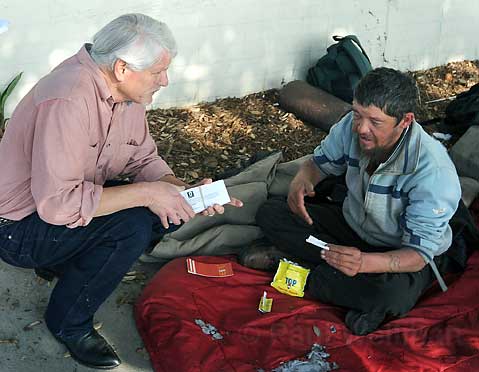Cops Close Inquiry into Homeless Man’s Death
Santa Barbara Police Issue Confusing Statement About Ross Stiles; Coroner Says Case Still Open

Unless new information emerges, the Santa Barbara Police Department’s investigation into the death of Ross Stiles is officially closed, a police statement said today, Wednesday, March 18. Stiles was a 43-year-old disabled homeless man who camped outside the Cabrillo Boulevard restrooms and a familiar face to those who frequented the beach-front bike path.
Stiles died February 4 after emergency surgery failed to reverse damage caused by massive swelling of his brain. The Santa Barbara Police statement said, “[T]he coroner’s report was inconclusive and could not indicate the cause of Mr. Stiles’ brain swelling, which ultimately resulted in his death.”
However, Judi Fitzgerald of the Santa Barbara County Coroner’s office said the coroner had not yet completed its investigation into Stiles’s death. “The case is still open,” Fitzgerald said. Neither the office’s autopsy or toxicology report had been concluded, Fitzgerald said.
But police spokesperson Sgt. Lorenzo Duarte said the investigation is closed because detectives couldn’t prove Stiles died at the hands of another human being. Even after multiple interviews of Stiles’s acquaintances, they couldn’t definitively conclude Stiles’s had been assaulted.
Two witnesses to the crime, homeless people as well, recalled crossing the street the night of February 1, and hearing glass breaking and seeing two people running from Stiles’s campsite. The next day, Stiles told friends he’d been hit over the head and had a headache.
According to his camping companion, Stiles’s symptoms worsened and by February 3, he was delusional. Friends called 911 and police said when they arrived at his campsite, Stiles did not mention being assaulted, only that his head hurt. Shortly after arriving at Cottage Hospital, doctors performed emergency surgery that proved unsuccessful.
Sergeant Ed Olsen, who supervises the department’s crimes against persons division, said even though the coroner’s report wasn’t complete by the time the police released their statement on Wednesday, he had been told what the final conclusion would be during a February conversation with the case’s lead coroner. “I don’t know why the report wasn’t completed but the coroner told me that the report was inconclusive,” Olsen said.
That police are concluding their investigation after a little more than a month is bound to reinforce cynicism among homeless toward city police, who they believe are only interested in citing and arresting them. Mike Foley, executive director of the Casa Esperanza homeless shelter, said he was confused by today’s police statement: “How can you have brain swelling and you die from it and the coroner can’t tell you why. That makes no sense to me.”



